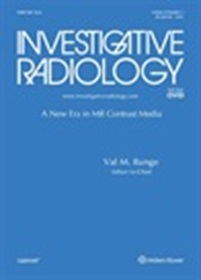Oral Manganese Chloride Tetrahydrate: A Novel Magnetic Resonance Liver Imaging Agent for Patients With Renal Impairment: Efficacy, Safety, and Clinical Implication.
Abstract
Abstract: Manganese-based contrast agents (MBCAs) show promise to complement gadolinium-based contrast agents (GBCAs) in magnetic resonance imaging (MRI) of the liver. Management of patients with focal liver lesions and severely impaired renal function uses unenhanced liver MRI or GBCA-enhanced MRI. However, unenhanced MRI risks reducing patient's survival.Gadolinium-based contrast agents, which help to detect and visualize liver lesions, are associated with increased risk of nephrogenic systemic fibrosis in renally impaired patients, a severe adverse event (AE) with potentially fatal outcome. Therefore, use of GBCA in patients with impaired renal function requires careful consideration. Other concerns are related to tissue deposition in the brain and other organs due to lack of gadolinium clearance, which could lead to concerns also for other patient populations, for example, those exposed to multiple procedures with GBCA. Of particular concern are the linear chelates that remain available for liver MRI, where there is no replacement technology. This has highlighted the urgency for safer alternatives.An alternative may be the drug candidate Ascelia-MBCA (ACE-MBCA, Orviglance), oral manganese chloride tetrahydrate. This candidate effectively visualizes and detects focal liver lesions, as demonstrated in 8 clinical studies on 201 adults (healthy or with known or suspected focal liver lesions). ACE-MBCA has a low and transient systemic exposure, which is likely the reason for its beneficial safety profile. The AEs were primarily mild and transient, and related to the gastrointestinal tract. This new, orally administered product may offer a simple imaging approach, allowing appropriate patient management in renally impaired patients when use of GBCA requires careful consideration.In this review, we highlight the clinical development of ACE-MBCA-a novel, liver-specific contrast agent. We begin with a brief overview of manganese properties, addressing the need for MBCAs and describing their optimal properties. We then review key findings on the novel agent and how this allows high-quality MRIs that are comparable to GBCA and superior to unenhanced MRI. Lastly, we provide our view of future perspectives that could advance the field of liver imaging, addressing the medical needs of patients with focal liver lesions and severe renal impairment.Our review suggests that ACE-MBCA is a promising, effective, and well-tolerated new tool in the radiologist's toolbox.





